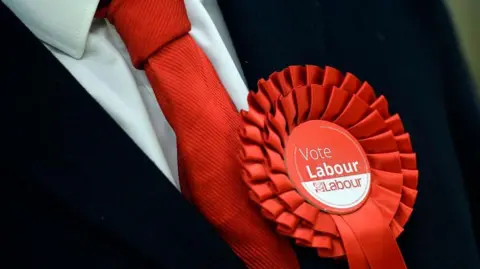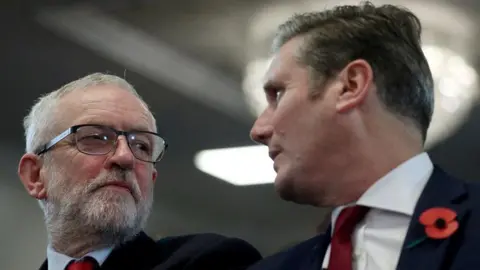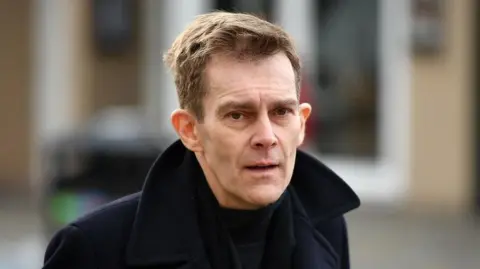ARTICLE AD BOX
13 minutes ago
Iain Watson,Political correspondent

 PA media
PA media
The Labour Party has abandoned longstanding legal action against five former members of staff who have been accused of "conspiring" against Sir Keir Starmer’s leadership.
The action is estimated to have cost the party millions of pounds, which critics said could otherwise have been spent on the general election campaign.
The five included two key figures from the Jeremy Corbyn era – ex- director of communications Seumas Milne and Mr Corbyn’s former chief of staff Karie Murphy.
They were accused of leaking a controversial report soon after Sir Keir became the Labour leader in 2020.
'Eye-watering sums'
A former shadow cabinet member – who did not wish to identified – told the BBC the party should have dropped the legal action earlier.
He said: "This is a huge embarrassment for the party, which has wasted eye-watering sums which could have made the difference in key seats in this election."
Labour had said previously it had been confident of its case.
The most recent documents presented in open court last autumn showed that Labour had spent £1.5m on legal action, and estimated it would spend nearly £900,000 more.
The party's final costs are likely to be higher, as these figures don’t reflect the full cost of the litigation.
But it’s not clear if the party will meet the costs of those it claimed had leaked the controversial report.
In a statement to the court, Labour officials claimed that the five "entered into a conspiracy to use unlawful means… to provide a copy (or copies) of the Report to the press" to damage the party "under the leadership of its then new leader, Keir Starmer".

 Reuters
Reuters
Jeremy Corbyn and Keir Starmer on the campaign trail in 2019
Through their lawyers, the five had "strenuously denied, and have consistently denied, any involvement or complicity in the leak whatsoever".
A very senior official in the party previously described the legal action to the BBC as a "gamble".
And concerns had been raised privately about pursuing it by some Starmer supporters who were no fans of the Corbyn leadership.
The 860 page leaked document ostensibly examined the handling of antisemitism complaints under Mr Corbyn’s leadership.
But it was a lot more than that.
The report's contention was that anti-Corbyn staffers had impeded progress on antisemitism complaints, and it suggested some of them had diverted funds away from certain constituencies in the closely-fought 2017 election which the party needed to win.
But perhaps the most controversial aspect was the inclusion of unredacted emails and WhatsApp messages from Corbyn critics, which laid bare internal tensions and factionalism.
Some of the messages contained derogatory comments about pro-Corbyn MPs and staff.
Mounting costs
A subsequent report into the leak and the wider culture in the party by Martin Forde KC found, for example, ‘the criticisms of Diane Abbott are not simply a harsh response to perceived poor performance – they are expressions of visceral disgust".
The report had been intended as a submission to the Equality and Human Rights Commission (EHRC), which was, at the time, in the process of completing what would be a highly-critical report of the party’s response to complaints of antisemitism during the Corbyn leadership.
Following legal advice, the party’s then general secretary Jennie Formby did not submit the document to the EHRC and decided it should not be made public, but it was leaked early in April 2020, within a week of Starmer becoming party leader.
Even though the party was under new management following Starmer’s election as leader, it faced legal action from nine people - most of whom had made anti-semitism complaints - who said their privacy and data had been breached.
Labour named the five it considered responsible, including three more ex-staffers - Georgie Robertson, Harry Hayball and Laura Murray, who had been closely involved in drawing up the report – and took legal action with the aim of making them, and not the party, predominantly liable for any damages.
But even when the nine people who had alleged that their data had been breached discontinued their legal action in September last year, the party continued to pursue the five to try recover some of its mounting costs.

 Getty Images
Getty Images
Seumas Milne was Jeremy Corbyn's communications chief
Party infighting
High Court documents set out Labour’s case against the five – including suggestions that they had discussed leaking the document as part of a communications strategy in 2020.
The lawyers for the five said what had been discussed had been instead a "rough plan" to brief "a narrative’ of the document to the press - with any confidential information redacted – but only in the event it was submitted to the EHRC, which never happened.
None of the five, their lawyers said, had considered the disclosure of the full unredacted report and they had condemned the leaking of the full document as "reckless and foolish" and not politically sensible.
Perhaps more significantly, three inquiries or investigations into the leak had been conducted. The party itself appointed an independent investigator, Morag Slater, whose report was unable to name the leakers.
The wide-ranging Forde report in to the party’s culture concluded in 2022: "We could not identify the source of the leak."
And the Information Commissioners Office - the UK’s data watchdog - told the BBC 18 months ago that it had found "insufficient evidence" that "any individual had unlawfully obtained or disclosed personal data".
A joint statement from Labour and from lawyers for the five states: "The party is discontinuing its legal claims against Karie Murphy, Seumas Milne, Georgie Robertson, Harry Hayball and Laura Murray on a ‘no order as to costs’ basis. The five welcome the resolution of the claims."
With Jeremy Corbyn now expelled from Labour’s ranks, and standing against the party at the general election, the current leadership is likely to be relived too that this long-running reminder of party infighting has concluded - but not without a political and financial cost.

 7 months ago
21
7 months ago
21








 English (US) ·
English (US) ·